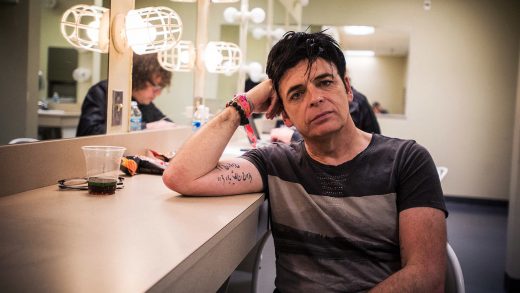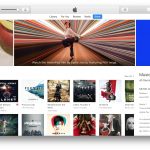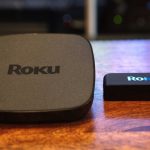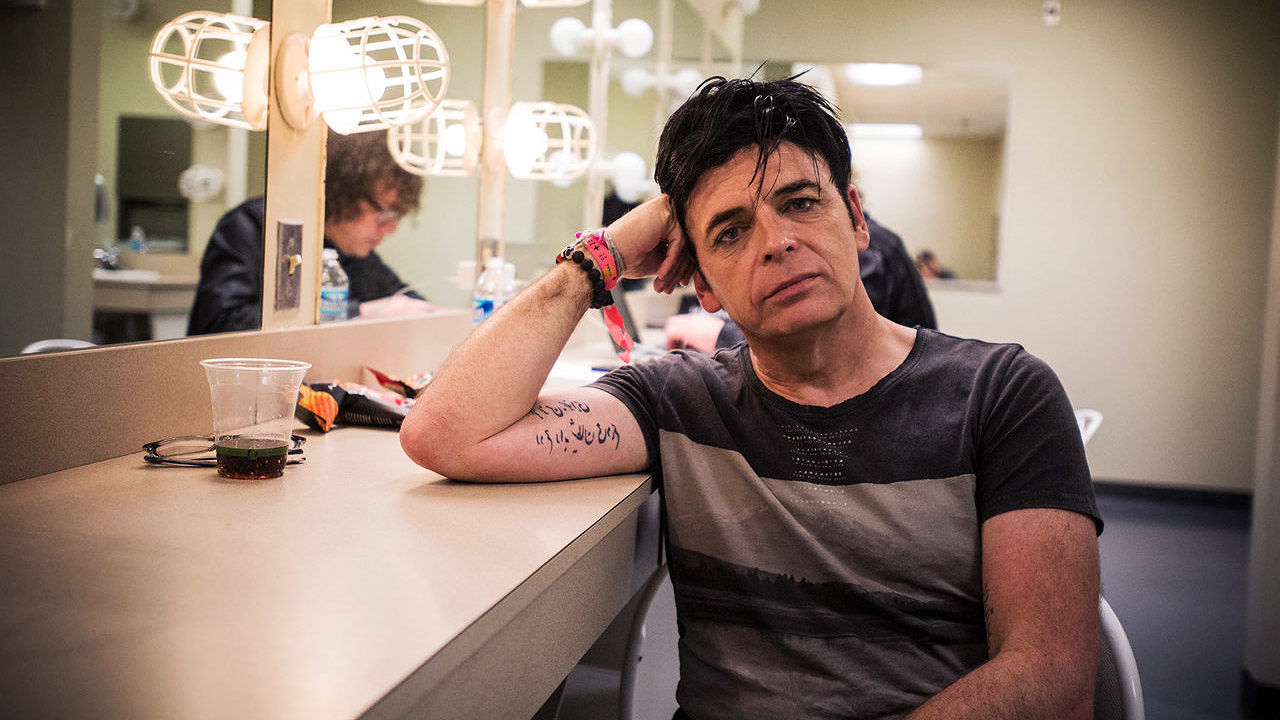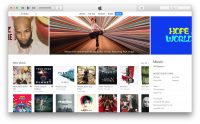Gary Numan Thinks The Music Industry’s Collapse Is A Beautiful Thing
Gary Numan was an accidental pioneer. While recording with his band Tubeway Army in 1978, the British musician stumbled across the Minimoog synthesizer and began using the machine to give his songs a more electronic flavor. Despite his record label’s fierce skepticism, Numan would quickly score now-recognizable hits like “Cars” and “Are Friends Electric?”
Numan’s unexpected success in the 1970s and ’80s helped pave the way for a new breed of artists who would dial back the guitars in favor of the less conventional sounds of the synthesizer. His dark-tinged, post-punk electronica had a massive influence on everyone from Trent Reznor to Wu Tang’s RZA.
Last weekend, Numan received the Moog Innovation Award at the Moogfest music and technology festival in Durham, NC. Moog, one of the companies that pioneered synthesizers in the late 1960s, brought its vintage Minimoog Model D synthesizer back into a limited-run production for the festival and awarded one to Numan, who performed a three-night residency at the festival. Fast Company sat down with Numan in his dressing room before his performance on Saturday to talk about the Model D and the ways in which technology has changed music over the course of his career.
You just won this year’s Moog Innovation Award and they gave you a new Minimoog Model D. Tell me about what that particular instrument means to you and how it fits into your creative process. Why is the Model D important?
It’s the instrument that I discovered electronic music with. It’s hugely important in terms of my history. I discovered electronic music quite by accident. I went to a studio called Spaceward in Cambridge in 1978 to record a punk album. It was going to be our debut album [with Tubeway Army]. I get to the studio and my mates are unloading the guitars and the drums and I went in to say hello the man that was managing the studio. There was a Minimoog D in the corner. I had never seen a real one before and I hadn’t even been that interested in electronic music, to be honest. I had heard a couple things I had liked, but a whole lot of stuff that I hadn’t. But I’m quite geeky so the fact that it had switches and dials was fascinating. So I said, “Can I have a go?” I fired it up and pressed the key. I had no idea how to set them up. But luckily, it been left on that now famous, growly Moog sound. It was just unbelievable! The whole room shook. I was totally sold.
So as they’re loading in the gear, I’m already in there beginning to convert my guitar and bass punk songs into these amateurish electronic versions. They were pretty surprised. By the time we were done, there would be three or four different versions of the songs. But I’d say “No, no. We’re not doing it like that now. Guitar won’t be on it.”
It was just the most exciting thing. I don’t even know how to describe it. I thought it was a game-changing machine. I didn’t realize at the time that other people had already discovered it. I knew about Kraftwerk. I knew about [Brian] Eno’s work with David Bowie. But I didn’t know about this. I think because of the way I found it and because I was trying to convert punk songs into electronic songs, the music itself—by accident, not by any great cleverness of mine—was also a type of music that I hadn’t heard. The Eno stuff was grandiose, almost classical, but electronically classical. Kraftwerk seemed synthetic. To say there was no soul to it is insulting and I don’t mean it like that, but there was nothing organic about it. This had synth, but it had drums and bass and the vocals, so it kind of merged two worlds together, quite by chance.
For the next few days we we worked on the album and they allowed me to keep using this thing, which was so cool of them because I hadn’t paid for it. I did begin to tweak and turn and twitch the controls. I never really got on top of it. To this day, I can’t claim to be any kind of synthesizer expert at all. To me, it was all about twiddling that knob and seeing what happens. I love the experimentation of it.
So more than anything else, it was the unique sound of the Moog that drew you in.
I’ve always been so much more interested in sound and in noises than I’ve ever been in technique. I don’t know the names of chords. Put me in front of a keyboard and I can play stuff. I have no idea what it is. And I should be embarrassed but I actually don’t care. I like what it sounds like. And I will feel where the tune needs to go. Not because I know what notes work, but because I will find out what works for me. It’s a very unstructured, musically illiterate way of working.
The amount of time I spend with synthesizers is relatively minimal, even though I make electronic music. I walk around banging things, scraping them. Making up a vocabulary of sound and noise. I used to carry a stereo dictaphone around. It’s amazing how many really cool sounds are in everyday life. London has this underground train system. And if you’ve ever been on one of these underground trains—especially the older ones—when they start to slow down, they make the most unbelievable noise. If you can stand in the right place and put your microphone out there, it’s unbelievable. It’s like a descending, howling sound. It’s just beautiful. So it’s not just about synthesizers. They’re just a part of what I’ve been interested in over the years. It’s just noise. I love noise.
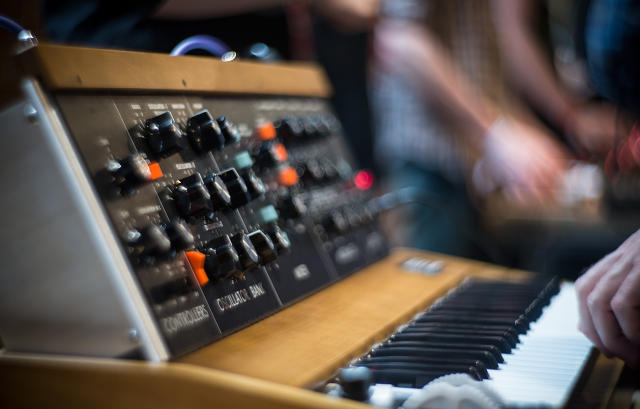
Because electronic music is technology-driven to a large degree, it’s endlessly exciting. There’s always new things coming along. With the software synths now, it’s staggering what they can do compared to even five years ago. As electronic musicians, we are lucky in that we are being fed these new tools on a regular basis. And they just keep getting better and more capable and more inspiring. In a way, I think hardware synthesizers have lagged somewhat behind the development of software. I shouldn’t say this. They just gave me a Minimoog and I don’t want to seems ungrateful! I do think what they’re doing is great. I’ve got a [Moog] Voyager at home. Great machine. But I do think that the big strides have been taken in the software. It’s just a quantum leap in capability.
So the record company sent you in to record a punk album with distorted guitars and bass, but you came back with something totally different. How did that go over?
I went back to the record company with that record, which obviously wasn’t what they expected or wanted. We had this massive disagreement. Really heavy. I was convinced that electronic music was going to become massive. Not because I was doing it but because my feeling was that somebody else would find a Minimoog in a studio and would do something with it. I honestly thought at that time that I was the only one that knew about it and was doing that kind of merging of sounds. That was my argument with the record company: This is something absolutely new. This is going to be massive. Not me necessarily, but as a type of music. I just thought it was amazing what the Minimoog was capable of and the power that it had in it.
One director was totally against it, but the other one decided that they would go for it. I often wonder if it was just because they didn’t have the budget to send me back into the studio. So it went out, and it did alright. Nothing special, but it didn’t die the death that they thought it would. So they let me do another one. That one was called Replicas. That one came about five or six months later. That one did really well. It had a number one single come off of it, a song called “Are Friends Electric?” The album went to number one in Britain. Within months of finding the synthesizer, it was all exploding.
After our album came out, I looked around to see if anyone else did know about it and who was out there doing it. I realized that not only was I not at the beginning, I was scraping in right at the end. Plenty of other people were doing what I was doing, and doing it better in many cases. Ultravox were on their third album. I just made my first, thinking I was the only one that knew about it. It was all regional. Every city had its own underground electronic act. I don’t even know if any of them knew about each other either. Everyone’s in their bedrooms working away, thinking that they’re the only one doing it. It was the most unknown movement. A movement of 25 bands all in isolation, not really knowing about each other.
Ultravox started to appear on this underground TV show for alternative music. I noticed that there were things not right about it. The way they looked, the things they talked about, the music, the way they dressed. It didn’t all gel somehow. I thought, electronic music is not a visual thing. It’s not the same as a guitar, where you can stand there and look like a sex god, because you’ve got the right shape. It’s a different sort of thing and it needs to be presented in a different way. I started to line my musicians up in a row, very much like Kraftwerk were doing. The first chance I got to do a TV show, I would only have white light. I would have floor light coming up so we would create weird shadows. Anything you could do to make you look different, striking or unusual. Wearing makeup. Everyone wearing black. We got the opportunity to do Top of the Pops. I noticed on there that everyone that was signing would always be looking at the camera. It was considered skillful to be able to read where the cameras were. And I thought that wasn’t the way to do it. To me, I thought a line would be much more powerfully delivered if you would choose the right moment to look at the camera and deliver that one line. To the people at home, I thought it would be like you were looking right at them, rather than smiling into the camera the whole time. Whether any of that had any effect on why I made it and they didn’t, I don’t know. But that’s what I thought at the time.
So aesthetics had almost as much to do with it as the sound. Do you think that defying expectations and doing things your own weird way helped your success?
I know there was a certain amount of luck involved. There was a picture disc put out of my song. I was almost an unknown so that was a very cool thing to have happen. That definitely helped shift the record up to the a certain point and get it noticed. It may well be that my skill in playing had a tiny effect and that the rest of it had a big effect.
I was obsessed by the whole thing: synthesizers, the music itself, the way the business was working. The business itself was in a really transient point. We’d just had the punk explosion, so there were lots and lots of new labels springing up over the place trying to sign these bands. It was just a really interesting time. There seemed to be, for a brief time, a lot of opportunity that wasn’t normally available. I grabbed onto that to get the deal in the first place and then found the synthesizer and loved it. “Are Friends Electric?” went to number one. And then it kind of opened the doors. A lot of new electronic people came through. Pretty much all the ones that were there before me were able to come through. At the time, I was not the most popular person amongst them. There was an interview with Orchestral Manoeuvres, who were actually mates of mine, in which they said they saw me as the Johnny-come-lately of electronic music. Because they had been out there doing it for a year or two. And then I come along and bam! I’m number one. Which just annoyed the fuck out of them.
You talk about that being a transient time in the music industry. Obviously, things today are radically different. There’s a lot of debate over the way things have changed and whether it’s better for artists or worst for artists. What do you think?
I find it absolutely fascinating. I love it. There’s all this talk of streaming and how awful it is. And it is. As far as artists getting paid, it’s awful. But there is so much opportunity now. And it’s all swinging toward the artists. There’s still a shit ton of corruption that’s going on. These movers and shakers are set up with Spotify and this money that’s vanishing into the ether. A lot of that is rumor mongering, I guess, but some things are not right.
But I don’t care about any of that, to be honest. What’s really cool is that I think the days of the record company are numbered. That’s not a bad thing. I think they’ve screwed artists really badly for decades. They still are. Now it’s all swinging toward label services, which is a much better thing for the artist. The thing is, as an artist, I would much rather have the fan standing right there. They give me their money. Here’s my album. We have a little chat. Fantastic. A nice, close interaction. We’re talking to each other and there’s nobody in between. I think the music industry has been plagued by people getting in between artists and fans.
We’re getting into a situation now where this much closer connection between fan and artist is not only achievable but desirable. And everybody wins. Fans are getting what they want. They’re getting closer access to the bands they like. The Internet is enabling things like Pledge Music, where you can interact and you can actually see the album being made and be a part of the whole process. They’re seeing things that they never would have seen before. At the end of it, they’re getting an album and they have a much greater understanding of what it took to make it. Special versions, limited editions. Really beautiful quality packages, which nobody would have really bothered with as much before.
A lot of people say that, even as the old model collapses, there’s still a role for record labels to play. It might look very very different than it used to, but it still exists. But you’re saying: No, to hell with ’em. Why?
It was necessary for so long, but it’s becoming less and less necessary now. And I think that’s just brilliant. Years ago, I started to run my own label called Numa Records. This was the ’80s. Back when you still had your big record chains like Tower Records. They absolutely killed me. For example, I put out one album. They would order a thousand and they would only pay for one in 20 of those that they ordered. And if you didn’t accept that deal, they didn’t stock you at all. There was no Internet. No way of reaching out to people. No direct access. Because of those ridiculous deals, small labels, and probably even bigger ones would crumble. You’ve got no power. You’ve got nothing to fight them with. So you give them a thousand albums and then hope they do well enough that it gets in the chart. And then maybe someone else will stock it. And you can get your money. Nine times out of 10, that didn’t happen. You go out of business, the company folds. My record company folded fairly quickly.
You look at a 12-pound album, and six pounds of that went to the shop. Of the six that went to the record company, the artist ended up getting about 40 pence. We’d get the least of it than anyone! Fans hate us because they think we’re all rich and overpaid with supermodels hanging off of us on every street corner and driving around in Ferraris. And fucking record stores are killing it, making an absolute fortune. So, it started with them. The big record chains began to struggle and disappear. Aw! [Laughs] … That was such a good moment. I didn’t feel guilty at all. They ruined so many great little labels that could have done some really great things. And probably took down half the artists that struggled with them.
And then next come record companies. My first deal was for 4% of 90. And then it got improved to 8% of 90. Woooooee! Whoopie fuckin’ dookie. My early stuff is still with a label. It’s there forever. And even now it’s been raised to what the current legal minimum is. It’s still pathetic. You could not possibly earn a living, unless you’re Rihanna. Unless you’re selling in that volume. And now they’re doing these 360 deals, where they want a bit of your touring, your merchandising. They even want a share of management income, some of them. It’s the savage throws of a dying monster and the sooner it’s gone, the better. Get rid of it.
There are a lot of people who are really frightened about what’s going on at the moment. I’m the opposite. I think it’s an amazing time. It’s a golden era for bands. You’ve just got to be aware. You’ve got to be savvy with the technology that’s coming and adapt it to you, or you to it, whatever it might be. I’m optimistic, because I’m sure there are other things coming that are going to be really useful. But most of it involves direct access to fans.
I guess people’s experiences are going to be different, depending on what kind of career they’ve had. I’ve been pretty much independent for decades. I went against the record company route a long time ago. I’ve been trying to find ways of improving upon that for a long time. And now, it finally feels as if we’re getting there. We really do have tools that we can use that can just cut out so much of this other stuff that interferes and doesn’t do the job it says it’s going to do. Lies to you. Steals from you.
The business model of lots of different parts of the music business—management, agents, record companies, label services—they’re changing all the time. And they need to, because everything that was there before does not work anymore. In my opinion, any band that signs to a record label is making a mistake. I’ve been through some collaborations recently with some bands that signed to labels and they’re like “Fuck.” You look at the deals they’re getting. You’re never going to make anything. And because of that, you won’t be able to afford to make more music. It’s going to hit your music, your income. You won’t be able to sustain what you’re doing.
I’m such an advocate of going your own way and using what’s around us now. I’m really passionate about it. I talk to people about it all the time. I’ve got plenty of people that agree with me—And plenty that don’t, to be fair—but I believe that where I’m going is the way to go. With the new album, I’m doing this Pledge campaign, which is the first step of an independent route. And now I’m toying with the idea of not even going through label services’ distribution. We’ve got a big Facebook presence, a big Twitter presence. I’ve got my own online store. I don’t need these people in the middle. I can tour the shit out of it. I’ve got my own marketing and promotion budgets anyway. I’m keeping everything. Keeping ownership and control. Having no interference, creatively or otherwise. I just put my arms around it and keep it.
There are so many bands out there, all looking at what’s going on and coming up with their own answers to their particular problem as a band. And they’re very different, but we can all learn from each other. Did that work, giving it away? Not really! Maybe that’s not quite the answer then. What could you do instead? And a thousand other things. It’s a genuinely fascinating time. I can’t think of a time in the business when it’s been so open-ended. There are so many ways of going about it now. And we’re all looking for the one that suits us. It’s absolutely brilliant. I’m loving it.
It sounds like a pretty exciting time, at least from your vantage point.
Talk to me in a year and I’ll be bankrupt and saying “ah, fuck it!”
related video: t-pain talks about his evolution as an artist, rebranding, and the compromises he’s made in the music industry
Fast Company , Read Full Story
(14)

